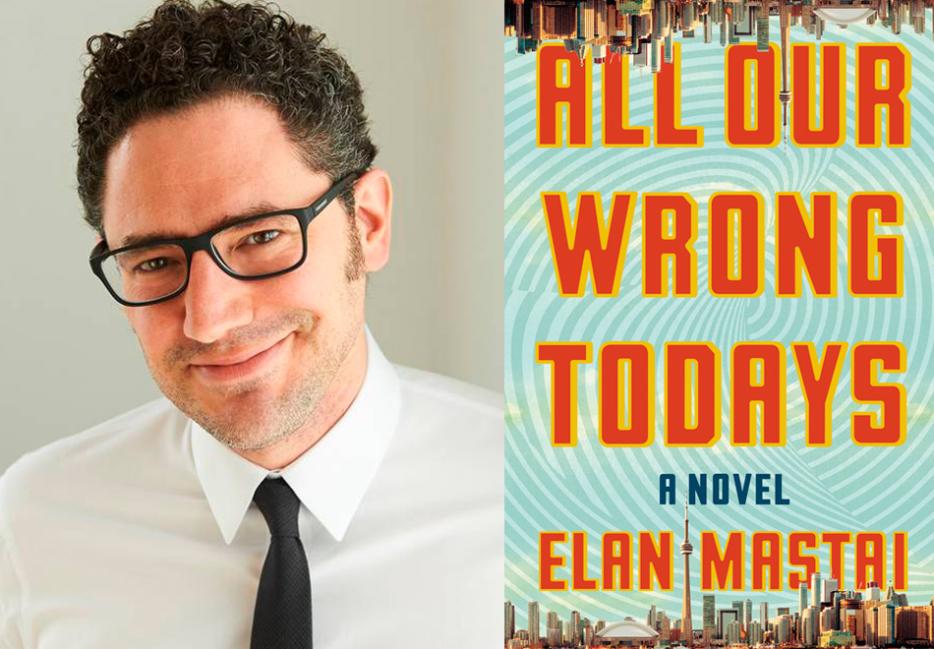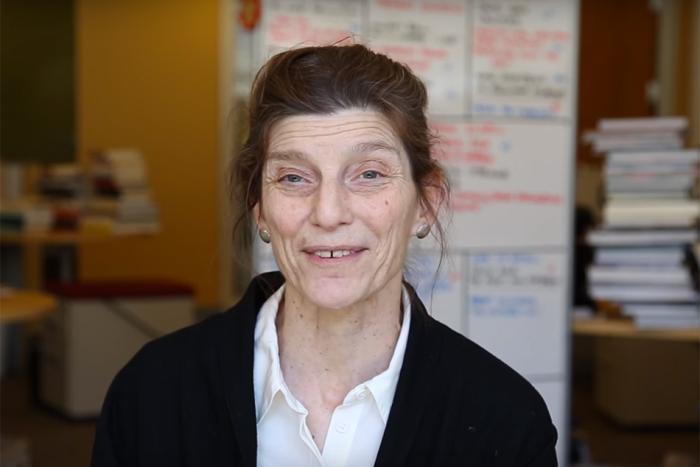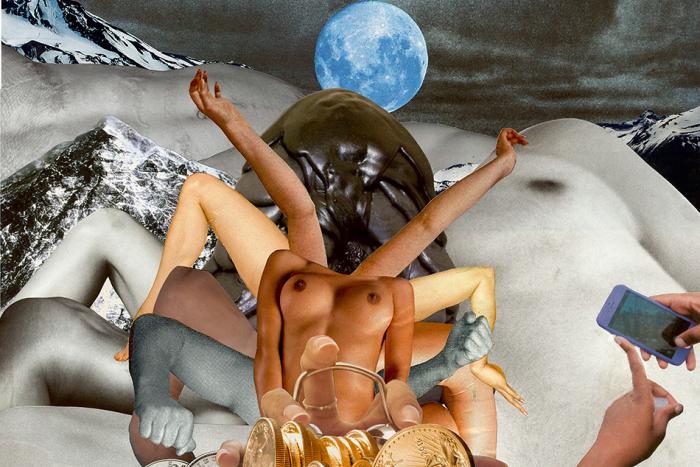Technically speaking, all novelists evolved from apes; Elan Mastai, however, may be the first to have evolved from writing about them. Though he has since acquired some serious acclaim for his modern rom-com The F Word, and now his debut novel, All Our Wrong Todays, his first gig was something a little less, uh, auspicious. Specifically, it was MVP 2: Most Vertical Primate, Air Bud Entertainment’s follow-up to its hit hockey-playing-chimp flick, Most Valuable Primate.
It was a chance, Mastai explains, that he got right out of film school: a friend had happened to get a job with the production company, and figured she could land the still heavy-on-the-aspiring writer a meeting with a producer, just so he could get some experience.
“I don’t know if she explained to him that I had never done this before,” Mastai recalls now. “But he was treating it like a real meeting, so I decided to treat it like a real meeting. He told me what he thought the sequel should be, and because I was literally told by my friend I wasn’t going to get hired, I pitched him an entirely different idea, that I was making up as I was sitting there. And he liked it.
“I didn’t even know what a screenplay looked like,” he continues. “I went out and bought the screenplay for Pulp Fiction, so I could just look up what I was supposed to do. It went so far that I made my script 134 pages long, because Pulp Fiction was 134 pages long. That turns out to be crazy long for a children’s movie. The producer described it as War and Peace with Chimps.”
A few drafts later he had winnowed it down to Tony Hawk with Chimps, and was now in possession of a green-lit movie with his name in the credits. If stumbling into an extreme sports monkey flick was not a suitably bizarre debut, though, life had a considerably darker curveball: just as MVP 2 was set to go into production, Mastai’s mother was diagnosed with terminal cancer. He finished his last touch-ups on the script in between hospital visits.
“She was diagnosed very late; she got sick very quickly, she died very quickly,” he says. “At that point it was just this other thing that was going on.
“But I was able to sit with my mom, and talk about my experience, and how I was going to have a movie made. And even though it was this silly kids movie, it wasn’t really my thing, it made me feel like I had some idea of how to do this. I wasn’t deluded, I know it’s not how it normally works, but I could tell my mom I was a screenwriter. The gift of that movie was that I could tell my mom that I had figured out what I wanted to do,” he explains. “When I look back on it now, in some ways the last gift that she gave me was that I stuck to that plan. Because I don’t know if I would have. It’s a long path. But we got to have that conversation, where I told her I was going to be okay, and then I actually did it, because I said that to her.”
All Our Wrong Todays is the culmination of that conversation in more ways than one. It follows Tom, a denizen of the future we were supposed to have: flying cars, limitless energy, the whole Jetson-caboodle. When his mother is killed by one of those cars, though—not even utopias are perfect—it sets off a chain of events that sends him to our present, a dystopian hellscape of fossil fuels and iPhones. As he struggles to get back to his world, Tom is forced to reckon with the man he hasn’t quite yet become, and figure out how to get by with things that can be fixed: however far humanity has come or will go, we are still pretty dumb animals after all.
Hazlitt: So, I guess I want to start with the character of Tom, who strikes me as a bit of left-turn. He comes from this wonderful, utopian place, but he’s basically as close as that world gets to a fuck-up. He’s not the silver-suited genius who invented this stuff—he doesn’t even know how most of it works.
Elan Mastai: No, he’s the son of that guy. The son who knows who’ll never top his father, so why try? Part of it is I like the idea of someone who’s aggressively ordinary in an extraordinary world: if you lived in that world, you wouldn’t be amazed by everything—it would just be the technology of your world. We don’t all walk around staring at cellphones, gazing at how incredible they are. We walk around staring at them because we’re texting people and trying to get Wi-Fi signals. I wanted it to have a very nonchalant, skeptical, slightly bemused tone. But I also wanted someone who would go on a journey, somebody who would be self-effacing, very aware of his own foibles, making bad decisions. And part of that is because he comes from a world where, fundamentally, you don’t take responsibility for the consequences of your actions. Literally, robot maids will clean up your messes. So he’s almost immediately overwhelmed by the complexity of the problems that face him. As much as it is a story about time machines and alternate realities and flying cars, it’s really a story about somebody who has to get his shit together and grow up. The consequences of his bad decisions are cataclysmic, and nobody can fix them except for him. That story in this fantastical world, the contrast between that and the mundane, is really interesting to me.
There is more to his mundanity, though, in the sense that he’s not just a man-child: he’s also someone who’s dealing with pretty profound grief, in the sense that he lost his mother. For all the flying cars and stuff, the novel really is shot through with a lot of grief, and how people deal with it.
I lost my mom when I had just turned twenty-six. And it happened quite suddenly. At the time, I don’t know that I perceived it as a hinge moment in my life, but it turned out that way. And I think I just finally felt ready to write about it. Based on my personality, I’m not going to write, like, a very sad memoir about losing my mother. But the idea of being able to take big, fun ideas—an alternative, pop, futuristic version of the present, and the mordant idea of having someone arriving here and receiving our world to be a dystopia, and then grafting that on: a character who loses a parent earlier in the story, and then goes through terrible decisions and makes things even worse.
The utopia/dystopia thing is a really stark metaphor of what life feels like before you lose a parent and what it feels like after. On the one hand, there’s something a little bit perverse about writing a book about the loss of a mother through time machines and alternate realities, but hopefully it’s also a much funner way of talking this stuff. That’s what I like about science fiction: you can use wild metaphors to explore very human things.
I’m sort of glad your … I just realized that I’m going to say that I’m glad we can talk about your dead mother.
[Laughs] It was a while ago. I can talk about it now.
There’s a really great passage where Tom is talking about how grief isn’t an emptiness, it’s a weight. And I think generally in the book there’s this sense that grief kind of crushes your sense of self-identity, or maybe just your ability to think critically about yourself. Not that we generally have a lot of that anyway.
No, but that emotion, that profound emotion does have a way of dismantling whatever feeble rational structures you’ve wrapped around yourself. Whether it was truly steady, or it was an illusion, it’s all thrown out. Even if you thought if you were fine—or maybe I would have said I thought I was compartmentalizing things—you’re really not. As humans, we like to believe we’re in control. Inevitably, whatever we think we’re in control of is a total delusion. Inevitably, things are much more complicated than we can really accept. One of my favourite quotes—from someone who you would never think to quote—is from Mario Andretti: If everything seems like it’s under control, you’re just not going fast enough.
That idea of control is pretty central to the novel as well, the ways in which these unintended consequences keep coming back to bite us. Obviously that’s literal in Tom’s case, but even generally, there’s that great line, “Optimism is the pyre we’ve set ourselves afire on.”
Aflame. I remember changing that, because of the weird pyre/fire rhyme.
Right. Probably a good idea to avoid rhyming where possible. I am kind of curious about that, though, because the book is ultimately reasonably optimistic, from Tom’s perspective. He does seem to change, to learn, to exercise some measure of control over himself. Is that your way of saying maybe optimism isn’t so unfounded?
When I was younger, a film student, I thought the cheesiest Hollywood thing was them saying that people could change. Every Hollywood movie was about the same thing, about people changing—for the better. And I thought that was ridiculous, because nobody ever changes. As I’ve gotten older, now I feel like the only honest and realistic thing about those Hollywood movies is that people only change if forced to. It’s only through crisis, through catastrophe, through profound challenge that anybody changes. And even when that happens, you do everything you can for as long as possible to avoid changing until you can’t go back. You’ll only change when the status quo is ripped away from you, gone forever. That’s when you’ll have to change. I’m an optimistic guy, but I’m an optimistic realist. I don’t believe in any black and whites, I believe in a lot of gradients of grey, and I very much believe we don’t solve anything until we embrace that. It’s only when you embrace how messy real life is, the complexity of everything, that you have the opportunity to fix anything. To me, whether it’s political rhetoric, self-help, your personal or professional life, you have to embrace the complexity of the challenge, otherwise you’re just deluding yourself, and whatever fix you’re applying is going to be haphazard and paltry.
That kind of speaks to another thread in the book, very much related to the lack of control: that idea of the accident of something. That is, when you create something, you also create its accident. It’s control sort of shrunk down to its most basic form: you think you’re creating something wonderful like the car, but you’re also going to kill people with the car accident. We’re always fundamentally underestimating the situation.
I find that concept fascinating. The unintended consequences, what happens when your invention actually hits the real world. It’s great to be optimistic about how technology will transform the world. But technology is a tool, and tools are used by people, and if you don’t factor in human nature and the chaos and complexity of the real world, you don’t know what you’re in for. Think of the internet, the incredible effect it’s had on our culture. All of human knowledge at our fingertips. But at the same time it’s had this effect of making all information equal: fact and fiction become option, reality is a subjective choice, and the you can use the internet to live in whatever bubble you feel like. That’s the accident of this incredible technology.
That idea strikes me as pretty fundamental to the idea of utopia and dystopia in fiction, too. Traditionally, I think maybe you could argue that dystopias are something like warning signs, the things flagging the accident: socialism seems great, but watch out for Big Brother, something like that. Maybe it’s just because we are almost living in someone’s idea of a dystopia now, but a lot of our contemporary dystopian stuff—The Walking Dead and things like that—seems less like a warning than a kind of nihilistic revelry in the idea that everything might be going to shit.
Literature and pop culture often have a different relationship with the unintended consequences of change. Literature has a long history of grappling with the implications of things, where we’re going—inevitably, visions of the future are anxieties of the present. But pop culture tends to be more pulp—it tends to reflect the sensibility of the time in a less self-conscious way. So as our visions of the future have become more fraught, more full of dread, I think nihilism has become more seductive, because it removes responsibility from the individual to effect any change. If everything is this inevitable slide into decay and chaos, then you don’t have to do anything. There’s no personal responsibility in a zombie apocalypse. Your only responsibility is survival, your personal survival. I think anything that lets individuals off the hook for taking any responsibility for the state of the world—that’s wrong. I wanted to write a book that started off as a very black and white utopia and dystopia, and got increasingly complex as it goes along. What do you mean when we talk about the future we want to have?
Well, a lot of those ’40s, ’50s, ’60s techno-utopian pieces of culture all happen in the shadow of the atom bomb—the knowledge that we could cause the whole world to blink out in an instant. And there was a lot of worry about that, but there was still this pervading sense of the grandiose world of the future, this incredible Disney-ish Tomorrowland kind of thing. I don’t think we believe in that future anymore, as a culture. Why the change in tone, do you think? What was it that was more dampening to our spirit than the atom bomb?
So, Expo 86 was a really big thing for me. I grew up in Vancouver, and it was a classic World’s Fair experience. I spent a lot of time that summer on the grounds, and there were monorails and robots and this vision of the future. It was only recently I discovered that was the last one done in North America. We haven’t hosted it since. We have kind of stopped dreaming of that future. What happened, in the most essentialist way, was we became increasingly aware that there were consequences to our behaviour for the planet—that the planet couldn’t just absorb whatever we did to it indefinitely. People didn’t want to believe that. They still don’t want to believe that. But that is becoming increasingly difficult to believe. Doesn’t mean a lot of people don’t still believe it, but the contradictions are so stark now.
That fundamental idea has polluted everything. It’s polluted our political culture, our popular culture, our imagination of the future. The idea that our behaviour is not consequence-free, not just in our everyday lives, but towards our earth, our only home. I feel like big ideas like that take a long time to percolate through the culture. It takes generations. We are the generation now that has grown up only knowing the contradiction between our belief that human ingenuity can solve anything and the knowledge that we’re making a mess of things. And it’s getting harder and harder to believe we can clean the mess up. I think that’s at the root of the curdling of our belief in the future. And it’s huge. The problems are very big and complicated. People don’t like being told they have to give up things. Even if there’s a potential for a better future. And I mean, I’m telling you very blatantly what I think about this stuff, but as a storyteller my job isn’t to harangue—it’s to write a hopefully interesting, page-turning story that, by the end of it, hopefully makes the reader ask personal questions about the consequences of their choices and figure out how they can get to the future they want to be living in.






